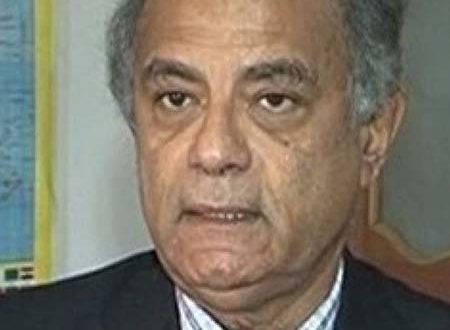The challenges that abound in the Middle East region will not be resolved by catering only for Israeli interests
Hussein Haridy
Those who have been closely following recent American moves in the Middle East; particularly in the course of May 2019, will be surprised with the larger strategic disconnect in the measures and policy positions by Washington on issues pertaining to war and peace in the region.
In the context of growing tensions between the United States and Iran, that originated with a sudden American warning against “imminent” attacks by Iran on American interests in the region, President Donald Trump announced earlier this week, that the US will deploy more troops to the Middle East. He spoke of 1,500 additional troops in order to counter Iran’s influence. The decision came after a meeting held at the White House a day earlier with acting Pentagon Chief Patrick Shanahan and Chairman of the Joint Chiefs of Staff General Joseph Dunford. According to Pentagon sources quoted in the American media, the US will also send additional intelligence and reconnaissance aircraft as well as a fighter aircraft squadron to provide “additional deterrence and depth to [American] aviation response options”. That is to say, additional military capabilities to strike deep into Iranian territories in case war breaks out with Iran, the outbreak of which seems unlikely given present circumstances.
The additional reinforcements add to an impressive American armada in the Gulf. On Thursday, 16 May, the Pentagon had announced that two Navy guided missile destroyers, the USS McFaul and USS Gonzalez had entered the Persian Gulf to be part of the Abraham Lincoln Carrier Strike Group. The latest American deployment was received with scepticism by American lawmakers from both aisles. Senator Rand Paul (Republican, Kentucky) tweeted that he “strongly urges” President Trump to reconsider sending more troops to the Middle East. He called on the American president to trust his “instincts and follow what used to be his campaign promises and not the “neocons around who want to repeat past mistakes”. He had in mind, probably, a leading voice within the White House to strike Iran, National Security Adviser John Bolton.
A few days before President Trump said Washington would send more troops to the Middle East, the Omani Minister of State for Foreign Relations Youssef bin Alawi paid a visit to Tehran where he met with Muhammad Gawad Zarif, the Iranian foreign minister. Oman is known to be a kind of a mediator behind the scenes between the United States and Iran for the last 40 years. It hosted the secret talks that led to the signing of the nuclear deal with Iran back in July 2015, the signature foreign policy achievement of the Obama White House, known as the Joint Comprehensive Plan of Action (JCPOA). President Trump withdrew from this diplomatic deal on 8 May 2018 in fulfilment of his campaign promises on the one hand and as clear sign of unlimited support, diplomatically, politically and strategically, to Netanyahu’s Israel on the other.
Bin Alawi made no secret that Oman is trying to reduce tensions between Washington and Tehran. He stated other countries are doing the same.
Despite the latest American reinforcements in the Gulf, it seems that no one is interested to stumble by miscalculation into an open conflict, a situation that could help, in the short term, a de-escalation process in the Gulf.
Surprisingly, and while the American armada was sailing to the Gulf, the United States in partnership with the State of Bahrain is hosting a workshop in Manama 25 June to discuss the economic and financial dimensions of its much-awaited peace deal between the Palestinians and the Israelis. American negotiators who have been working on this deal for the last two years made clear that it would cover all aspects of the Israeli-Palestinian conflict, including final status questions. In this respect, we recall what Jared Kushner said about the two-state solution before the Washington Institute for Near East Policy 2 May. He pointed out that the term means one thing for the Israelis and something else for the Palestinians. Therefore, he believes it is best not to talk about it and instead concentrate on the practical aspects of the term.
The Bahrain workshop is intended from the American point of view and the Israelis to deal with the “future prosperity” of the Palestinians in the context of the expected American deal, decoupled from the political aspects of the Israeli-Palestinian conflict. The Americans hope to mobilise the astronomical sum of $68 billion dollars that should be earmarked to the Palestinian territories under Israeli occupation. The irony is that the extreme right in Israel wants to annex large portions of Zone C in the West Bank and bring it under Israeli sovereignty. Netanyahu had promised during the election campaign of April 2019 (he has not formed a government, so far) to convince the Trump administration to go along with such annexation. In the Trump White House, such a measure won’t find objections. I would rather argue that an understanding in this regard has already been reached tentatively. The economic workshop in Bahrain could be meant, among other things, to smooth over such a dangerous and destabilising undertaking.
What is really striking about the thinking of the White House concerning the Palestinian question under the Trump administration, the key to regional peace and stability in the Middle East, is the complete disregard for international law, UN resolutions on the matter, and previous American official positions on all of its political aspects, including that of the Palestinian refugees. Jason Greenblatt, the US special representative for international negotiations, told a special Security Council meeting on the Middle East on Wednesday, 22 May, that the UN Relief and Works Agency (UNRWA) “is currently running on fumes” and that the agency is “surviving on a surge in foreign donations in 2018 that is unlikely to be sustained this year, or in the future”. The American negotiator called for the shutting down of UNRWA.
But what to do with five million Palestinian refugees? The American answer, which is not different from the Israeli position for the last 70 years, was provided by Greenblatt. He told the Security Council that, “we need to engage with host governments to start a conversation about planning the transition of UNRWA services to host governments, or to other international or local non-governmental organisations, as appropriate.” He added that, “next month in Bahrain, we and many others will participate in an economic workshop on an alternative path with the potential to unlock a prosperous future for the Palestinians… ” He added that the reality — his reality — is that the UNRWA model has failed the Palestinian people.
Not to be outdone, the Israeli ambassador to the UN addressed the same special session, saying, “had the original 750,000 refugees been resettled in 1949, the Palestinian refugee crisis, and thereby their illegitimate claim of return, would not exist. But today approximately 5.4 million so-called refugees still hold onto the hope of return to houses in which they never lived. That hope, if realised, would erase the State of Israel — simply by sheer numbers.”
Of course, what both the senior American official and the Israeli diplomat told the Security Council could not be farther from historical truth. However, they reflect the current thinking in Washington and Tel Aviv on the possible elements that the American peace deal could consist of. No sovereignty for the Palestinians on their lands, occupied by Israel in 1967, no right of return whatsoever, no compensation for the properties lost in Palestine to the Israelis in 1948 and in 1967. Just a blurred vision of a certain economic prosperity, fictitious at best.
When it comes to questions of war and peace in the Middle East, a question comes to mind: Does the Trump White House take the Arab countries and the Palestinians seriously? Does it believe that the Arabs, including the Palestinians, would follow, blindly, American policies in the Middle East and the Gulf?
It seems to me that there is a worrisome disconnect between American policies in the Gulf and White House positions with regard to the Palestinian question. As long as this disconnect persists, American strategy in the Middle East will lack credibility.
Commenting on the latest moves by the Pentagon in the Gulf as announced in Washington last Friday, the Chairman of the House Armed Services Committee Adam Smith (Democrat, Washington), described the deployment of new troops as “unsettling”. He pointed out that the US posture in the Middle East should be “scrutinised if does not fit into a broader strategy”. He is right.
We can’t discern a broader and sustainable strategy for the United States in the Middle East and the Gulf. Supporting Israeli positions on all regional questions is not a workable or credible strategy.
War and peace in the region are much more serious than catering only to Israeli interests. Will American strategy as it unfolds before our eyes today remain the same if the American Electoral College elects a Democrat in 2020 as the next US president?
Arab governments should ponder such a possible result before deciding what options are available to them to deal with the myriad of strategic challenges actually facing them. One serious one is the Trump peace deal, if it will be officially announced.
The writer is former assistant foreign minister.
From: Al-Ahram Weekly






